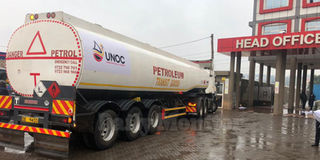Marking reduces fuel smuggling - Report

Fuel marking has been one way through which government curbs smuggling and adulterated. PHOTO/FILE.
What you need to know:
- Fuel marking is one of the ways through which government fights smuggling and adulteration of petroleum products, which causes massive losses in terms of revenue.
Fuel marking has almost hit 100 per cent, according to a study by the Atlantic Council Global Energy Centre.
The study authored by Dr David Soud with support from Dr Ian Ralby and Rohini Ralby indicates that whereas the global petroleum downstream sector continues to face criminality and smuggling, Uganda has, through the Fuel Marking and Quality Monitoring Programme, achieved substantial success against adulteration, which has reduced from more than 29 per cent in 2008 to just 0.5 per cent.
The programme, which names and shames non-compliant petroleum product dealers has over the years compelled an improvement in fuel marking, a key standard essential in elimination of fuel dumping and smuggling.
Uganda, according to the Uganda Bureau of Statistics, imports an average of 2.19 million cubic metres of petroleum products with an annual growth of at 4.5 per cent.
The 0.5 per cent reduction, therefore, means that out of the 2.19 million cubic metres of imports, only 10,950 cubic metres is smuggled into the marked.
Fuel marking in Uganda is conducted by SICPA SA and SICPA Global Fluids Integrity SA in partnership with Ministry of Energy and Uganda National Bureau of Standards under which an invisible chemical supplied by SICPA is added to fuel products used on the local market.
Governments across the globe suffer considerably from the negative impact of fuel theft and adulteration causing an estimated loss of $133b annually.
Its consequences include revenue loss for governments, environmental damage, public health risks and threats to competitiveness.
According to the Ministry of Energy and Mineral Development Sector Performance Report, at least 139 fuel retail outlets were inspected in 2020, majority of which were closed for participating in illegal operations, among them dealing in adulterated fuel.
However, this was a substantial reduction from more than 300 dealers that were cautioned and some closed for dealing in adulterated fuel in 2017.
Some of the closed facilities, the report noted, were habitual offenders while others were mainly new entrants taking advantage of the system or retailing fuel without requisite licenses.
Fuel marking is provided for under the Petroleum Marking and Quality Control Regulations, 2009, which emphasise monitoring and inspection of all fuel products entering the country through border points.
Adulteration becoming common
According to the Atlantic Council Global Energy Centre report, adulteration of road fuels is increasingly becoming common in the developing world, which has forced a number of countries to establish fuel markers to fight the growing vice.
For instance, the report notes, in Mozambique, a Fuel Integrity Programme had in just six months of implementation seen a 32 per cent increase in fuel-related tax revenues.
This had been achieved through a substantial reduction in smuggling and under declaration of fuel imports.
In Tanzania, the report indicates that while in 2007 as much as 78 per cent of the fuel on the country’s market was adulterated, this had reduced to just 4 per cent in 2019, which, according to the University of Dar es Salaam led to an increase in revenue to about $200m between 2010 and 2013 alone.




